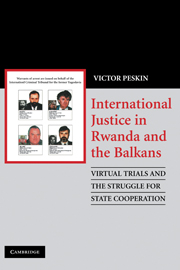 International Justice in Rwanda and the Balkans
International Justice in Rwanda and the Balkans Book contents
- Frontmatter
- Contents
- Maps and Timelines
- Acknowledgments
- Permissions
- Note on Pronunciation
- MAP 1 Map of the Former Yugoslavia
- MAP 2 Map of Rwanda
- PART I INTRODUCTION
- PART II THE BALKANS: STRATEGIES OF NON-COMPLIANCE AND INSTRUMENTS OF PRESSURE
- PART III RWANDA: VIRTUAL TRIALS, INTERNATIONAL JUSTICE, AND THE POLITICS OF SHAME
- PART IV CONCLUSION
- 10 The Present and Future of International Criminal Justice
- Bibliography
- Index
10 - The Present and Future of International Criminal Justice
Published online by Cambridge University Press: 05 September 2012
- Frontmatter
- Contents
- Maps and Timelines
- Acknowledgments
- Permissions
- Note on Pronunciation
- MAP 1 Map of the Former Yugoslavia
- MAP 2 Map of Rwanda
- PART I INTRODUCTION
- PART II THE BALKANS: STRATEGIES OF NON-COMPLIANCE AND INSTRUMENTS OF PRESSURE
- PART III RWANDA: VIRTUAL TRIALS, INTERNATIONAL JUSTICE, AND THE POLITICS OF SHAME
- PART IV CONCLUSION
- 10 The Present and Future of International Criminal Justice
- Bibliography
- Index
Summary
Overview
The international war crimes tribunals that emerged in the early 1990s sought to distance themselves from the first generation of tribunals established by the victorious Allied powers at Nuremberg and Tokyo nearly half a century earlier. This new model of justice would be truly independent and fully international in origin and operation. Such autonomy and neutrality would ensure the new tribunals' legitimacy, and thereby help fulfill their ultimate mission of rehumanizing nations, communities, and individuals rent by atrocity and trauma. Whereas the Nuremberg and Tokyo military tribunals prosecuted only the crimes of the losers, the United Nations International Criminal Tribunals for the Former Yugoslavia and Rwanda would prosecute war crimes suspects from all sides of an armed conflict. And whereas the Nuremberg and Tokyo courts were arms of the Allied occupation forces, the ICTY and ICTR were intended to be free from control by any state or group of states. But being created without a standing army was not meant to leave today's tribunals powerless. The UN Security Council endowed the tribunals with the legal authority to carry out their mandate to prosecute war crimes, crimes against humanity, and genocide without state interference. When called upon by these courts, all UN member states would be legally bound to cooperate without delay. This requirement of state compliance would particularly oblige those nations complicit in atrocities to hand over the suspects, witnesses, and evidence essential for the trial process and the survival of the tribunals.
- Type
- Chapter
- Information
- International Justice in Rwanda and the BalkansVirtual Trials and the Struggle for State Cooperation, pp. 235 - 258Publisher: Cambridge University PressPrint publication year: 2008
- 1
- Cited by
